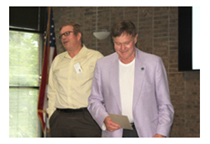Need Your Team Results to Grow? NAFA CEO Phillip E. Russo, CAE, Suggests "C.A.R.E."
![]() Print this Article | Send to Colleague
Print this Article | Send to Colleague
Fleet managers have many challenges not just when it comes to team member “management,” but also in building a culture of innovation and support. Additionally, developing more effective philosophies, work processes, and results can’t be done just through a team leader handling ALL of the problem solving.
NAFA CEO Phillip Russo, CAE, suggests using a team leadership philosophy that he refers to as “C.A.R.E.”: Creative, Accountable, Responsible, and Empowered. This strategy, he noted, drives his approach to overseeing the staff at NAFA, and is a great model to use in fleet operations, too.
 Russo made his comments on July 20 as a speaker at the 100 Best Fleets’ “Best Practices” conference, in Princeton, N.J. The event was hosted by Tom Johnson (pictured, right, with Ron Hall), leader of the 100 Best Fleets organization, and included more than a dozen fleet speakers. Johnson is holding similar events in several cities across the U.S. this summer and fall (see the list here).
Russo made his comments on July 20 as a speaker at the 100 Best Fleets’ “Best Practices” conference, in Princeton, N.J. The event was hosted by Tom Johnson (pictured, right, with Ron Hall), leader of the 100 Best Fleets organization, and included more than a dozen fleet speakers. Johnson is holding similar events in several cities across the U.S. this summer and fall (see the list here).
The “C.A.R.E.” approach gives the individual team members the ability and leeway to meet challenges through their own knowledge, intuition, and skillsets, with guidance from the team leader. It not only makes the team members more engaged, but also brings a much wider array of ideas into the organization – leading to better results for your customers, members, or colleagues.
“It’s what I try to do every day at NAFA,” Russo said. “It leads my philosophy of being a ‘servant leader,’ to meet the needs of our Members while guiding staff to create a broad problem-solving and Member-focused atmosphere.”
Fleet managers can adopt this leadership approach by always focusing on their “constituents,” which are the people they serve, and the missions of those people. “You’re saving lives through EMTs, creating safe communities with police, and helping people with special needs live better lives,” Russo noted. “Make that constituent the most important thing in the world.”

